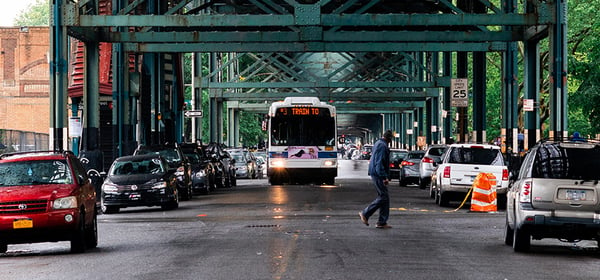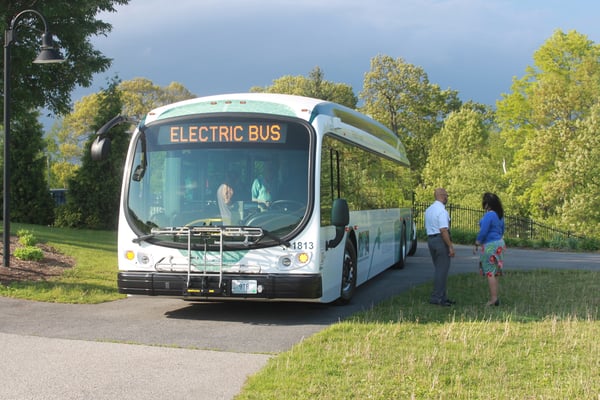 Transportation is the largest source of climate-warming emissions in both Rhode Island and Massachusetts, so Green Energy Consumers Alliance is focused on finding policy solutions to advance low-carbon alternatives to gasoline. How the states structure their transportation budgets will be a key factor for how they expect to meet 2030 climate mandates.
Transportation is the largest source of climate-warming emissions in both Rhode Island and Massachusetts, so Green Energy Consumers Alliance is focused on finding policy solutions to advance low-carbon alternatives to gasoline. How the states structure their transportation budgets will be a key factor for how they expect to meet 2030 climate mandates.
The Rhode Island Department of Transportation (RIDOT) recently submitted a plan to allocate $750 million in federal funding from the Infrastructure Investment and Jobs Act over the next 10 years. Green Energy Consumers Alliance, along with our friends at GrowSmartRI and Providence Streets Coalition, expressed concern over whether the plan properly considered climate change and the emissions impact of the investments proposed.
As an article in the New York Times noted, the federal funds can be a tool to decrease the climate-warming impact of our transportation systems… or they can make the problem worse by continuing business-as-usual, expanding car-centric infrastructure without expanding the network of EV charging stations, transit service, or safe paths for walking and biking.

Since the amendment was announced, local media outlets have picked up the story and asked RIDOT for a response to the concerns of advocates. In EcoRI, RIDOT falsely implied that maintaining a state of good repair for bridges and roads is incompatible with climate action: "RIDOT sincerely hopes that the Green Alliance [sic] is not asking RIDOT to let bike and pedestrian paths fall into a state disrepair so that both riders and walkers are not safe and the paths become unusable."
RIDOT made an even sillier assertion to the Boston Globe: "Good roads reduce emissions by giving people a quicker and safer way to get where they’re going." The state must both maintain a state of good repair and create a real plan to deliver safe, reliable, and clean mobility options for Rhode Islanders.
We note that out of $750 million in federal infrastructure dollars allocated to Rhode Island, just $25 million is specifically earmarked by federal guidelines for carbon reduction. As it stands, RIDOT proposes using the carbon reduction funds for repaving existing bike paths and improving congestion monitoring systems - worthy investments, perhaps, but not commensurate with what Rhode Island must do to comply with An Act on Climate.
As important as maintenance is, the carbon reduction funds must be spent to accomplish what they're intended for. RI now has a legally-enforceable mandate to reduce emissions, and RIDOT's current proposal to spend the $25 million won't move the needle as much as we'd like. A clearer strategy with the input of stakeholders and the public is needed.
 As for the remaining $725 million, there should be greater effort to integrate climate impact into the decision-making where there is discretion to do so. In addition to keeping roads, bridges, and walking/biking paths safe, RI needs to prioritize projects that will reduce emissions. The first step would be to adopt a rule to assess how each project will reduce or increase emissions.
As for the remaining $725 million, there should be greater effort to integrate climate impact into the decision-making where there is discretion to do so. In addition to keeping roads, bridges, and walking/biking paths safe, RI needs to prioritize projects that will reduce emissions. The first step would be to adopt a rule to assess how each project will reduce or increase emissions.
Think of emissions-reduction like sticking to a diet; nutrition information can help make sure you’re eating foods that align with your health goals. Moreover, you can’t spend 95% of your grocery budget on bacon, donuts, and soda, then expect one bundle of kale to make up the difference.
The Colorado Transportation Commission just approved a rule to keep to its state’s emissions diet; the rule requires State DOT and planning councils to measure climate impact of its investments and offset them. The rule is estimated to shift $6.7 billion through 2050 to transit and active mobility. Before Rhode Island invests a once-in-a-generation pot of federal funds, a rule like Colorado’s is necessary.
We know that the State’s effort to implement the Act on Climate will include a strategy for transportation. We hope to continue to work with RIDOT and the EC4 (the body of state agencies to implement the Act On Climate) to come up with solutions to meet the 2030 climate mandate cost-effectively for Rhode Islanders.



Comments